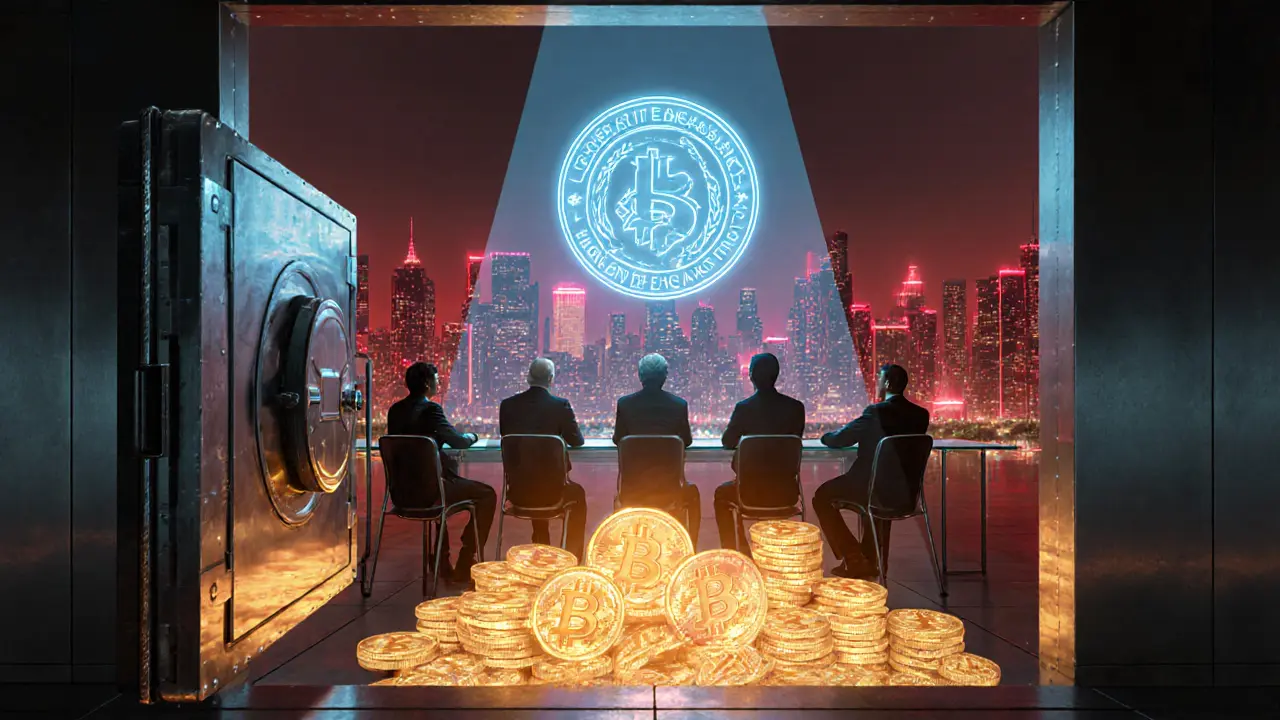El Salvador Bitcoin Policy Impact Calculator
Total Reserve Value
Adoption Rate
Business Acceptance
Tax Payments in BTC
Key Insight: Despite 50% wallet adoption, only 13% of users make weekly transactions, indicating limited real-world usage.
Current Status: Voluntary Bitcoin acceptance
Effective Date: May 1, 2025
Legal Tender: Optional payment method only
Government Holdings: 6,102 BTC (~$500M)
When ElSalvador announced that Bitcoin legal tender would sit side‑by‑side with the U.S. dollar, the world watched a bold experiment unfold. Fast‑forward to 2025, and the country has rolled back the mandatory part of that policy while still holding a sizable Bitcoin reserve. This guide walks you through why the law was introduced, how it worked, why it changed, and what the numbers tell us about its economic impact.
Why Bitcoin Became Legal Tender
On September72021, the Legislative Assembly passed the Bitcoin Law, making Bitcoin a recognized form of payment across the nation. The move was championed by Nayib Bukele, the President of ElSalvador who positioned the policy as a catalyst for financial inclusion and foreign investment. Two main goals drove the decision:
- Financial inclusion: Roughly 70% of Salvadorans lacked access to traditional banking services. By giving everyone a free digital wallet, the government hoped to leapfrog conventional infrastructure.
- Remittance efficiency: Remittances account for about 20% of GDP. Bitcoin promised faster, cheaper cross‑border transfers compared with legacy money‑transfer operators.
Supporters also argued that Bitcoin could attract tech‑savvy investors and position the country as a regional crypto hub.
How the Chivo Wallet Was Launched
The state‑run Chivo wallet, a mobile application designed to store, send, and receive Bitcoin and U.S. dollars was the backbone of the policy. On launch day the servers crashed under the weight of millions of download requests, forcing a temporary shutdown. By midday, the government had expanded capacity and brought the service back online.
To jump‑start adoption, the state deposited a $30 “seed” amount into every citizen’s wallet. Gas stations even offered a 20‑cent‑per‑gallon discount for purchases paid with Chivo. Within a month, the app recorded 3million downloads - roughly 46% of the country’s population - far outpacing the 29% bank‑account penetration recorded in 2017.

What the Law Required of Businesses
Initially, the Bitcoin Law obligated all merchants to accept Bitcoin alongside the dollar. Failure to comply could result in fines or license revocation. However, compliance proved problematic:
- Many point‑of‑sale systems lacked the technical ability to process QR‑code payments.
- Volatility scared both small shop owners and larger retailers from pricing goods in Bitcoin.
- Only 7% of surveyed companies reported receiving any Bitcoin payments in the first month.
By 2022, the government introduced voluntary reporting mechanisms, but the mandatory clause remained on the books until early 2025.
Real‑World Adoption Numbers
High wallet downloads did not translate into everyday usage. Survey data shows a stark gap:
| Metric | 2021 | 2022 | 2023 | 2024 |
|---|---|---|---|---|
| Wallet downloads (% of population) | 46% | 48% | 49% | 50% |
| Active weekly transactions (% of users) | 12% | 15% | 14% | 13% |
| Businesses accepting Bitcoin (% of surveyed) | 7% | 10% | 9% | 8% |
| Tax payments in Bitcoin (% of total tax receipts) | 5% | 4% | 3% | 2% |
By 2024, 92% of Salvadorans still did not use Bitcoin for everyday purchases, and only a handful of large firms-primarily tech‑focused exporters-accepted it regularly.
The IMF‑Driven Reversal in 2025
In late2024, the International Monetary Fund (IMF) made a $1.4billion loan contingent on ElSalvador revisiting its crypto policy. The IMF warned that mandatory Bitcoin acceptance posed systemic risk and undermined fiscal stability. Under that pressure, the Legislative Assembly voted 55‑2 on January292025 to amend the Bitcoin Law.
The new amendment, effective May12025, removed the word “currency” from Bitcoin’s legal definition and eliminated the compulsory acceptance clause. Today, Bitcoin remains a legal tender only in the sense that it is a permitted payment method-businesses may accept it voluntarily, but they are not required to, and the government no longer permits tax payments in Bitcoin.
Economist Rafael Lemus, a leading Salvadoran economist, summed up the shift: "Bitcoin no longer has the strength of legal tender. It should have always been that way, but the government tried to force it into existence, and it didn't work."

Economic Impact Overview
While the policy attracted global media attention and a modest tourism boost, most economic analyses label the experiment a failure. Key takeaways include:
- Fiscal cost: The government’s purchase of Bitcoin to prop up the price during the 2021 crash resulted in a $3million paper loss on day one. By early2025 the Strategic Bitcoin Reserve Fund held 6,102BTC, valued at roughly $500million-still a profit overall, but the opportunity cost of those funds is debated.
- Financial inclusion: Wallet penetration exceeded bank‑account penetration, yet actual transaction usage lagged far behind, suggesting that mere access to a digital wallet is insufficient for inclusion.
- Remittance flow: Studies show only a marginal reduction in remittance fees, as many families continued to rely on established providers for reliability.
- Investor perception: Hosting the PLANB Forum2025 signaled ongoing ambition, but the policy reversal signaled to international lenders that crypto‑centric monetary policy carries high risk.
The net effect on GDP growth was negligible; ElSalvador’s annual growth hovered around 2% throughout the period, aligning with regional trends.
Lessons for Other Nations
ElSalvador’s experiment provides a real‑world case study on the challenges of imposing cryptocurrency at a national level. Key lessons for policymakers include:
- Mandating adoption without sufficient infrastructure leads to low merchant uptake.
- Volatility remains a deal‑breaker for everyday users; stablecoins or central bank digital currencies may be more pragmatic.
- International financial institutions will scrutinize crypto‑centric policies, especially when linked to sovereign debt.
- Financial inclusion efforts must pair digital wallets with education, reliable internet access, and consumer protection.
- A voluntary, market‑driven approach-rather than a legal‑tender mandate-appears more sustainable in the medium term.
Future countries considering a similar path are watching ElSalvador’s pivot closely, using it as a cautionary benchmark for balancing innovation with economic stability.
Frequently Asked Questions
Is Bitcoin still legal tender in ElSalvador?
Yes, but only as an optional payment method. The 2025 amendment removed the requirement for businesses to accept it and barred tax payments in Bitcoin.
How many Bitcoins does the government hold?
As of early2025, the Strategic Bitcoin Reserve Fund contains about 6,102BTC, worth roughly $500million at current market prices.
What was the purpose of the $30 seed money?
The government deposited $30 into every citizen’s Chivo wallet to encourage initial use and to demonstrate that Bitcoin could be a practical everyday tool.
Did the policy improve remittance costs?
Remittance fees fell only slightly because many users still trusted traditional money‑transfer services for reliability and speed.
Can tourists use Bitcoin in ElSalvador?
Tourists can pay with Bitcoin at the few merchants that accept it voluntarily, but the vast majority of businesses only take U.S. dollars.


Caleb Shepherd
October 7, 2025 AT 08:23Look, the whole Bitcoin saga in El Salvador was never just about tech; it was a rehearsal for a bigger power play. The government bought the coin not to empower citizens but to signal to the crypto‑elite that they could bypass traditional finance. When the IMF showed up with its loan conditions, you can see the same pattern of external forces dictating policy. That “voluntary” acceptance clause is just a polite way of saying “we’ll punish you if you don’t play along”. It’s a reminder that crypto experiments can be a front for geopolitical bargaining.
Monafo Janssen
October 13, 2025 AT 03:16The initiative really tried to bring banking to people who never had a chance before, and that intention deserves some credit. Giving every household a $30 starter fund was a bold move that startled many skeptics. Even though the adoption numbers look low, the fact that half the population downloaded the wallet shows curiosity and openness. Over time, with better education and stable tools, that seed could grow into genuine financial inclusion.
Michael Phillips
October 18, 2025 AT 22:09From a philosophical standpoint, imposing a digital currency by law raises questions about individual autonomy versus collective ambition. The data shows a clear gap between access and usage, suggesting that freedom to hold a wallet isn’t enough to change habits. People need trust, stability, and a clear value proposition before they will replace cash. The El Salvador experiment highlights that technology alone cannot reshape economic behavior without cultural alignment.
Jason Duke
October 24, 2025 AT 17:03Wow!!! This whole Bitcoin experiment was a roller‑coaster of hype, policy, and reality!!! The government’s $30 seed was a clever nudge, but the mandatory clause screamed overreach!!! It’s impressive that they kept the reserve even after the IMF push, showing resilience!!! Still, the low transaction rates tell us that enthusiasm can’t replace practicality!!!
Franceska Willis
October 30, 2025 AT 10:56Yo, that crypto mess was a total rollercoaster ride, man!
EDWARD SAKTI PUTRA
November 5, 2025 AT 05:49I feel for the Salvadorans who were promised a financial revolution and got a confusing roll‑back. The free wallets were a nice gesture, but without reliable internet and clear guidance many felt left out. It’s tough when hope turns into disappointment, especially when the world watches every step. Still, the experience can teach future projects how to better support communities.
Ritu Srivastava
November 11, 2025 AT 00:43It is morally indefensible for any government to gamble its citizens’ future on a volatile asset like Bitcoin. The policy prioritized political theater over genuine welfare, and the IMF intervention was a necessary reality check. By forcing businesses to accept a speculative currency, the state jeopardized livelihoods for the sake of hype. Such actions betray the trust placed in public officials and set a dangerous precedent.
Liam Wells
November 16, 2025 AT 19:36Whilst mainstream narratives celebrate El Salvador’s audacity, a sober analysis reveals a series of strategic miscalculations. The mandatory acceptance clause, despite its rhetorical flair, ignored the infrastructural limitations of the nation. Moreover, the reliance on a non‑stable asset undermines fiscal prudence, a point often elided by sensationalist coverage. One must also question the true motives behind showcasing the PLANB Forum amidst looming IMF conditions.
Nicholas Kulick
November 22, 2025 AT 14:29The Bitcoin law in El Salvador serves as a case study for the intersection of technology and sovereign policy. It began with a clear objective: increase financial inclusion for a largely unbanked population. The government allocated $30 to every citizen’s Chivo wallet to jump‑start adoption. Initial download numbers were impressive, surpassing half the nation’s residents. However, download metrics alone do not equate to active usage. Transaction data revealed that only about a dozen percent of wallet holders engaged weekly. Merchant acceptance remained stubbornly low, never exceeding ten percent of surveyed businesses. Tax payments in Bitcoin dwindled to a negligible fraction of total receipts. The IMF’s loan conditions forced a legislative amendment that removed compulsory acceptance. This pivot illustrates how external financial pressures can reshape domestic innovation. The strategic reserve of 6,102 BTC persists, valued at roughly $500 million, but its opportunity cost remains debated. Remittance fees saw only marginal improvements, suggesting limited practical benefit. The overall GDP growth rate stayed flat, indicating no macroeconomic boost. Public sentiment appears mixed, with some viewing the experiment as a bold step and others as a costly spectacle. Future policymakers can learn that technology deployment requires robust infrastructure, education, and voluntary participation. Ultimately, imposing a volatile digital asset without safeguards may undermine the very goals it seeks to achieve.
Jason Wuchenich
November 26, 2025 AT 01:49Great analysis, Nicholas! Your breakdown hits all the key points and keeps it clear. It’s encouraging to see such thoughtful reflection on what worked and what didn’t. Hopefully, other countries will take these lessons to heart and design more inclusive, voluntary approaches.